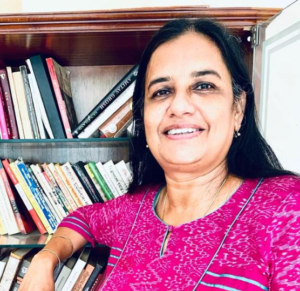Ms. Aparna Das is an architect by training, having obtained her Master of Science degree in Urban Development Planning from The Development Planning Unit at University College London, United Kingdom. Additionally, she served as a Special Program for Urban and Regional Studies (SPURS) Fellow at the Massachusetts Institute of Technology, USA, during the academic year 2018–2019.
With a career spanning over twenty-five years, Aparna has held significant roles, including Deputy Leader and Senior Advisor at GIZ, India. Throughout her professional journey, she has closely collaborated with various stakeholders, including the line ministries of the Government of India at central, state, and local levels, to implement diverse housing and urban development programs. She has forged partnerships with national and international NGOs, as well as with multilateral and bilateral agencies such as the World Bank, UNICEF, UNDP, and DFID, India.
Aparna’s focus lies in decoding complexities surrounding land contestations in urban areas and corresponding policy issues in cities in the global South. Currently, she is pursuing her PhD at the Henley Business School, University of Reading, UK. Her doctoral research centers on deindustrialization and its impact on city morphology in global South countries.
Project statement: Deindustrialization in Global South Cities: Impact on Morphology and Land/Property Markets
Case Study: Jute Mills in Dundee, Scotland, and Kolkata Metropolitan Area (KMA), West Bengal, India
The study positions itself within the framework of Southern Urbanism, acknowledging its unique characteristics. Southern Urbanism refers to the everyday realities of cities in the global South, encompassing regions in Asia, Africa, and Latin America. While recognizing the limitations of binary classifications, drawing on insights from Roy (2015) and Lawhon (2020), it can be argued that both the South and North hold analytical significance in research, despite inherent imperfections (Parida & Agarwal, 2022).
The overarching research question examines how deindustrialization processes manifest in cities of the global South, characterized by prevalent informality in land and property markets and influenced by post-colonial institutional frameworks. The primary focus is to investigate the functioning of land and property markets, encompassing both formal and informal sectors, within selected case studies. It is anticipated that Dundee (one of the case studies) may emerge as an outlier, while the other three cities within the Kolkata Metropolitan Area (KMA) will exhibit substantial similarities. Through the analytical framework of Property Rights Theory, the study seeks to delve into the underlying reasons for these disparities and elucidate the institutional arrangements, both formal and informal, and their interactions within these contexts.
This study employs the framework of Property Rights Theory (PRT) to understand how capital is accumulated and the role of the state in facilitating it in global South countries. PRT emphasizes the importance of well-defined and enforceable rights to use, control, and transfer property, including land, resources, and intellectual property. It explores how the assignment and protection of property rights affect economic behaviour, resource allocation, and the functioning of markets and institutions. Unlike industrialized countries, urbanization is occurring at a much faster pace in global South countries, amidst a context of weak institutions, particularly those gove.
Email: aparna.das@pgr.reading.ac.uk





